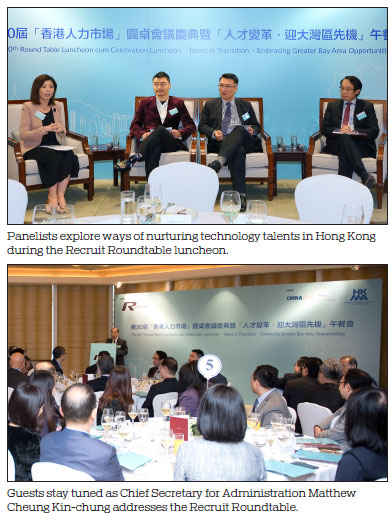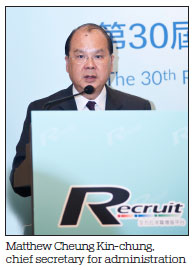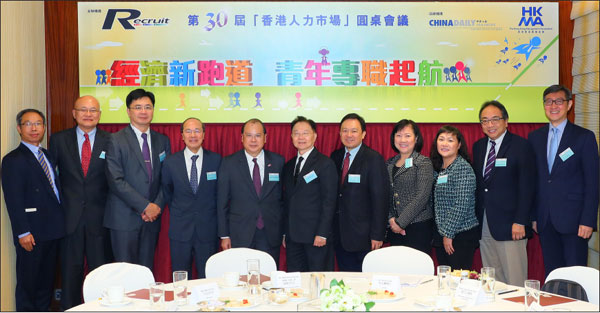Luring talents, changing mindsets critical in solving labor woes
Updated: 2018-12-14 06:49
(HK Edition)
|
|||||||
Macroeconomic changes and an aging population are taking their toll on the productivity of Hong Kong workers. But, as Oswald Chan reports, the Bay Area offers the impetus to invigorate the city's job market.
Changes in the global trade environment, coupled with growing unilateralism and China-United States trade tensions, are beginning to buffet the city's economy, exacerbated by a graying population and a low fertility rate.
According to government estimates, Hong Kong's workforce would start shrinking by 2020, and dwindle by between 200,000 and 300,000 in the next three decades.
The city's current working population stands at 1.51 million, aged between 15 and 39, with nearly half of them holding degrees, and 14.5 percent with diplomas, certificates or sub-degrees. Up to 30 percent of the workforce have only secondary-school education.
The 30th Recruit Roundtable held on Dec 7, hosted by all-round recruitment and education media Recruit, and co-organized by China Daily Hong Kong Edition and the Hong Kong Management Association, gathered government officials, academics and employers to exchange views on rolling out a blueprint for bolstering employment.
"The shortage of technology talent is a serious issue in Hong Kong, so the city should not rest on its laurels. The city should formulate and execute strategies on how to attract global technology talents amid the fierce competition for talents," Recruit Publisher Lau Chuk-kin told the roundtable luncheon.
According to the 2018 IMD World Talent Ranking released last month, Hong Kong was overtaken by arch rival Singapore as Asia's most attractive place for talents, while the SAR's global ranking dropped from last year's 12th to 18th this year, setting off alarm bells for Hong Kong's reputation as a talent hub.
Chief Secretary for Administration Matthew Cheung Kin-chung urged Hong Kong youths, talents and professionals to prepare themselves for the opportunities brought by the Guangdong-Hong Kong-Macao Greater Bay Area for better development prospects, with the Bay Area poised to be a global innovation and technology hub.
The Bay Area refers to the central government's scheme to link the Hong Kong and Macao special administrative regions with nine cities in Guangdong province - Guangzhou, Shenzhen, Zhuhai, Foshan, Zhongshan, Dongguan, Huizhou, Jiangmen and Zhaoqing - into an integrated world-class cluster. Their combined gross domestic product currently stands at $1.5 trillion, or 12 percent of the national economy, although the cluster is home to only 5 percent of the country's population.
Leveraging its world-class universities, its strength in research and development, robust judicial and intellectual property protection mechanisms, a sound business environment and its reputation as a safe and secure city, Hong Kong is pooling innovative resources from itself, the Chinese mainland and other parts of the world, Cheung said.
The SAR will broaden channels not only for international innovative businesses to enter the mainland, but also for mainland startups to go global, he said.
Hong Kong now comprises the ingredients of a global financial center like "Nylonkong" (New York, London, Hong Kong). "If she can have the potential of being 'the Silicon Valley in China', the city will have greater development prospects," Cheung said.
The HKSAR Government will help local industries, particularly medical care and education, to seize the opportunities in the Bay Area to solve the city's labor shortage problem.
Policy adjustments
Moreover, interconnectivity with other cities in the Bay Area will be strengthened via policy adjustments and breakthroughs. "The SAR government will seize the opportunities offered by the Bay Area and seek breakthroughs in existing operational mechanisms to enhance interconnection with other cities and facilitate the easy flow of productive elements under the framework of Closer Economic Partnership Arrangement," said Cheung.
Cheung, who also chairs the Human Resources Planning Commission, said the government will launch a social media platform in the first half of next year to provide information on career prospects, especially for youths.
Hong Kong's current employment market exhibits three trends that need to be addressed.
Firstly, there's a job skill mismatch in the market, whereas labor shortage is severe in some high-skilled job types. Moreover, the administration needs to create a continued education path, as well as an upward career development ladder, and should also recognize the need to enhance the sustainability of manpower planning.
Financial services, as well as professional and business support services, will continue to account for the bulk of employment in the local labor market. According to the SAR government, financial services now make up about 19 percent of the city's GDP.
Employment in the trade and logistics segment fell 4.45 percent between 2000 and 2016, while the other three economic pillars had employed more people during the same period. Employment in the financial services sector swelled by 50 percent, the tourism business skyrocketed 125 percent, and that in professional and business support services soared 48 percent, according to the Census and Statistics Department.
Employment in the insurance industry shows the most growth potential. At present, there are 21,000 people out of nearly 90,000 people in the insurance sector who are employed in the general insurance business. The industry provides job positions in specialty areas like underwriting, risk management and claims.
"Hong Kong youths seldom enter the insurance industry due to the industry's image of being only involved in selling life insurance products. The community does not have a thorough understanding of the industry. Actually, the industry embraces a spectrum of different duties that require a high level of specialty knowledge," explained Chan Pui-leung, chairman of the Hong Kong Federation of Insurers.
"Talent shortage is really near breaking point in the insurance business, leading to deficiency in mid-level management that may seriously crimp the industry's development. For example, most of the active shipping insurance agents are above 70 years of age in Hong Kong," he said.
"We hope the government and the recently established Insurance Authority can do more in promoting the insurance industry and conducting studies on talent supply in the industry."
According to the Vocational Training Council, the construction, civil engineering and construction environment industries hired more than 200,000 people last year. Besides, employment in the mechanical engineering sector rose 7.6 percent between 2015 and 2017, while the aircraft maintenance sector currently employs 5,500 people in the city.
"Hong Kong construction companies already are venturing out into other international markets, so there's a huge demand for construction high-level experts with multi-tasking skills in the construction industry, factory operation and automation technologies," said Conrad Wong Tin-cheung, vice-chairman of construction company Yau Lee Holdings and vice-chairman of the Vocational Training Council.
"Moreover, the automation process in the industry is driving up demand for high-skilled experts in artificial intelligence and robotics technology, but talent supply is tight since most of the local students pick up commerce studies rather than mathematics, chemistry and physics."
"Infrastructure and construction projects encounter volatilities so that we acknowledge the importance of training. We have collaborated with different universities to provide master degree courses, but we are concerned over whether young engineering graduates can have adequate time to be trained to perform their duties in quality and quantity," said Hongkong Electric Managing Director Wan Chi-tin.
Hong Kong's major utility providers teamed up with State Grid Corporation of China, Xi'an Jiaotong University and Hong Kong Polytechnic University to launch the Silk Road International School of Engineering in April - the first industry-university collaboration platform to nurture high-level talent in the power and energy field.
Through the platform, engineering students at PolyU can apply knowledge in engineering projects, while employees of Hongkong Electric can learn the theoretical basis of engineering projects. Overseas engineers from Central Asia, Africa and Southeast Asia can know how to ensure a stable electricity supply.
Property-related industries have also shown growth potential in hiring. The property maintenance management services and building and park maintenance services sectors have hired more than 100,000 people in the job market.
"We have made investments in automation technologies so our staff can no longer be required to perform those routine duties, making our staff more motivated," said Alice Ip Mo-lin, executive director of Sino Land - a local property developer with businesses spanning construction, property management and hotel operations.
Innovative laboratories
Olympian City - one of Sino Land's shopping malls - has installed the OC STEM Lab to incorporate experiences of science, technology, engineering and mathematics for children. The developer also aims to create more innovative laboratories to enable its employees to collaborate on how to devise more smart applications.
Sino Land has also launched various engineer trainee and qualification apprenticeship programs, and is cooperating with schools and universities to provide internships for students. It's envisaged that more students can be mentored to help bridge the talent gap.
"Traditional industries of Hong Kong can leverage innovation and technology to enhance its competitiveness and broaden industry development. We are working to accelerate the integration of the traditional and new economies," said Peter Yan King-shun, chief executive officer of Cyberport.
Cyberport is mulling to cooperate with various universities such as the University of Hong Kong and the Chinese University of Hong Kong to introduce courses such as insurance technology, cloud computing and financial technology applications.
"Looking ahead, we would like to elicit more banks and large-scale insurers to join us in designing more financial technology training courses with reference to virtual banking technology, insurance technology and remittance technology," Yan said.
Since 2011, Cyberport has been collaborating with Shenzhen and Guangdong on incubating technology startups and, looking forward, Cyberport aims to extend similar cooperation to other cities in the Bay Area.
"The education system and parent mentalities must be changed to face the 'new economy'. Corporations also have a lot to do in changing the mindset of young people to foster entrepreneurship by providing incentives," Hong Kong Management Association Executive Director and roundtable moderator Victor Lee Sze-kuen said.
Tsui Lap-chee, president of the Academy of Sciences of Hong Kong, highlighted that schools in Hong Kong only emphasize the results of key performance indicators in their appraisal exercises and are not concerned with promoting scientific education.
"We hope the Academy of Sciences of Hong Kong and secondary school principals and teachers can join hands in creating an ecosystem to foster technology industry talents," Tsui envisaged.
Meanwhile, the number of professionals enrolled in scientific research and development has more than doubled since 2010, while employees in the information technology services, and information services sectors had soared 36 percent to 87,700 from 2006 to 2016.
As Hong Kong strives to develop the four major technology sectors - biotechnology, artificial intelligence, robotics technology and financial technology - the government estimates that senior financial technology specialists, data scientists and cyber network security specialists, as well as innovation and technology specialists, are desperately needed.
In celebration of the 30th Recruit Roundtable, a luncheon was organized, inviting three panelists to explore the recruitment and entrepreneurial potential in the Bay Area.
Bosco Law Ching-kit, chief executive officer of Lawsgroup - a family-controlled group whose economic interests range from apparel manufacturing to retail and property - said their employees are willing to work on the Chinese mainland.
"We provide job training and different job positions in brand marketing, property projects, retail business and overseas business development to management trainees so that they can be motivated by giving them the vision of a career path," Law said.
"If Hong Kong can integrate with the development of the Bay Area, the city will have more career development opportunities for its youths," said Dennis Chow Chi-yin, southern region managing partner at Deloitte China.
"We encourage our staff to cultivate a cultural mindset of innovation and diversification, otherwise they'll be deemed obsolete in the labor market in future," he warned.
Wilson Chan Fung-cheung, associate director at MBA City University of Hong Kong and founder of Belt and Road Pioneer, said only when Hong Kong youths are ready to face the uncertainties, can they grasp the opportunities ahead. "They must do their homework before venturing out for entrepreneurship in the Bay Area and even to the Asian region."
Contact the writer at
oswald@chinadailyhk.com


|
The 30th Recruit Roundtable held on Dec 7 gathered government officials, academics and employers to exchange views on rolling out a blueprint for bolstering employment. Photos provided to China Daily |
(HK Edition 12/14/2018 page24)
